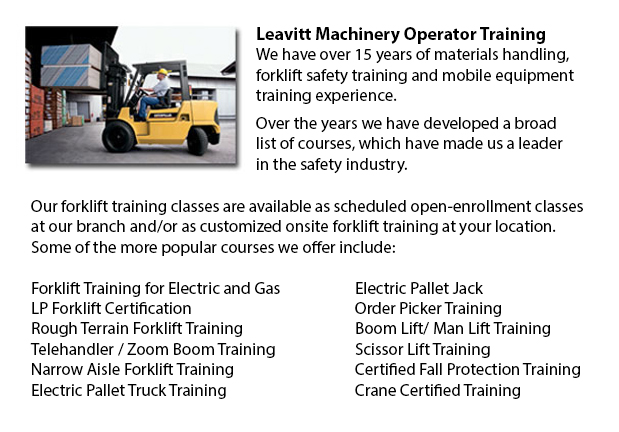
Guelph Forklift Training Classes - Lift trucks are a type of heavy lifting machine utilized in order to move and handle material efficiently and safely. Sometimes referred to as Lift Trucks, they are used in a variety of industries. Workers working with and around lift trucks should be trained to recognize dangers associated with the operation of forklifts.
We provide forklift training classes in order to teach our trainees how to safely make use of a lift truck. The theory part of the course will include classes and instruction on becoming a lift truck operator. Individual training will learn their legal responsibilities as forklift operators. Upon completion of the classes, a printed certificate will be given. The certificate must be signed by someone qualified to verify that a hands-on evaluation has been done in the trainee's workplace.
Forklift Safety
Forklift trucks are vital in industrial workplaces for their ability to lift and transport heavy loads. Forklifts are indispensable to many industrial worksites, but forklifts could be dangerous without correctly training workers. Forklift injuries, when they occur, tend to be serious because of the power of these heavy machines. Staff who work regularly around forklifts could become complacent and forget the dangers. Vital maintenance and operating procedures might be ignored.
Forklift training is needed for new workers, but all operators must undergo periodic re-training. First aid training is vital also.
The daily check is critically important in the everyday operations and maintenance of a forklift. The lift truck may become damage if not correctly maintained. Prior to being used, lift trucks should be visually checked as to their general condition. An operational inspection must be done in order to determine the machine is working correctly. The supervisor should be alerted if anything is noted which could impact the safe utilization of the lift truck.
Inspections should include checking the work area to make certain it is clear of objects that can be a problem. Overhead objects and obstructions should be inspected also. It is vital to have a working fire extinguisher available and accessible. Various levels must be checked, like fuel, radiator water, engine oil, and electrolyte levels in cells. Cables, plugs and batteries should be checked. Unclog vent caps and make certain that nuts, bolts, chains, guards, and hydraulic hose reels are not missing, loose or damaged. A tire check will ensure that wheels are not worn or damaged. Pneumatic tires will require a pressure inspection.
-
Guelph Warehouse Forklift Training Classes
Guelph Warehouse Forklift Training Classes - Warehouse training classes exist for the reason of raising awareness regarding common warehouse hazards. Students learn the important safety procedures that are necessary to warehouse safety. An emphasis i... More -
Guelph Forklift Operator Certification
Guelph Forklift Operator Certification - Certification for forklifts are needed to guarantee the safe use of forklifts for those employers in construction, industrial and warehouse settings. The training has to involve a method of education plus some... More -
Guelph Crane Training School
Guelph Crane Training School - The crane training school offers industry-relevant programs. Courses provide trainees with learning results that match current industry demands. Our small class sizes combine hands-on experience and theory. Our qualifie... More -
Guelph Heavy Equipment Training Programs
Guelph Heavy Equipment Training Programs - At whatever given construction site, there are usually various kinds of machines that are ready to be used. These heavy and light equipment need both operators to run them and mechanics to fix them. Apprenti... More -
Guelph Skid Steer Ticket
Guelph Skid Steer Ticket - On a skid-steer loader, the lift arms are at the side of the driver together with pivot points at the back of the driver's shoulders. This makes them different compared to a traditional front loader. Because of the operator... More -
Guelph Zoom Boom Ticket
Guelph Zoom Boom Ticket - Zoom Boom Training focuses on correctly training prospective operators on variable reach forklifts. The training goals include gaining the understanding of the equipments physics and to define the tasks of the operator. This... More -
Guelph Heavy Equipment Training
Guelph Heavy Equipment Training - Commonly, the different types of heavy equipment training are divided into 2 categories of machinery: those that have rubber tires and tracked vehicles. Tracked vehicles consist of items like for instance bulldozers,... More -
Guelph Aerial Lift Safety Training
Guelph Aerial Lift Safety Training - Each year, there are roughly 26 construction deaths due to the use of aerial lifts. Nearly all of the craftsmen killed are laborers, electrical workers, carpenters, painters or ironworkers. Nearly all deaths are c... More

Forklift Certification Guelph
TOLL FREE: 1-888-254-6157
Guelph, Ontario
forkliftcertificationguelph.com
Email Us
About Us


